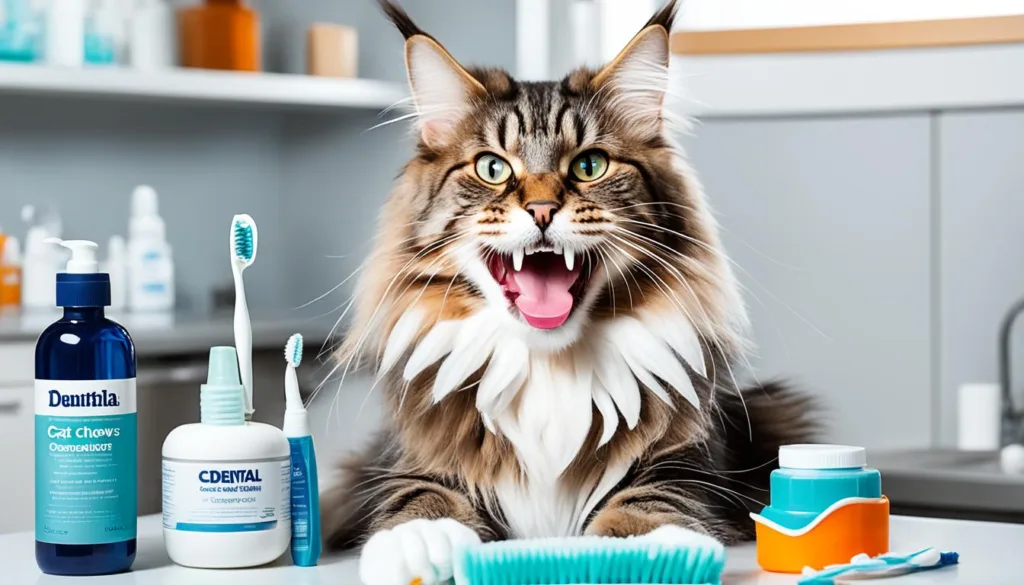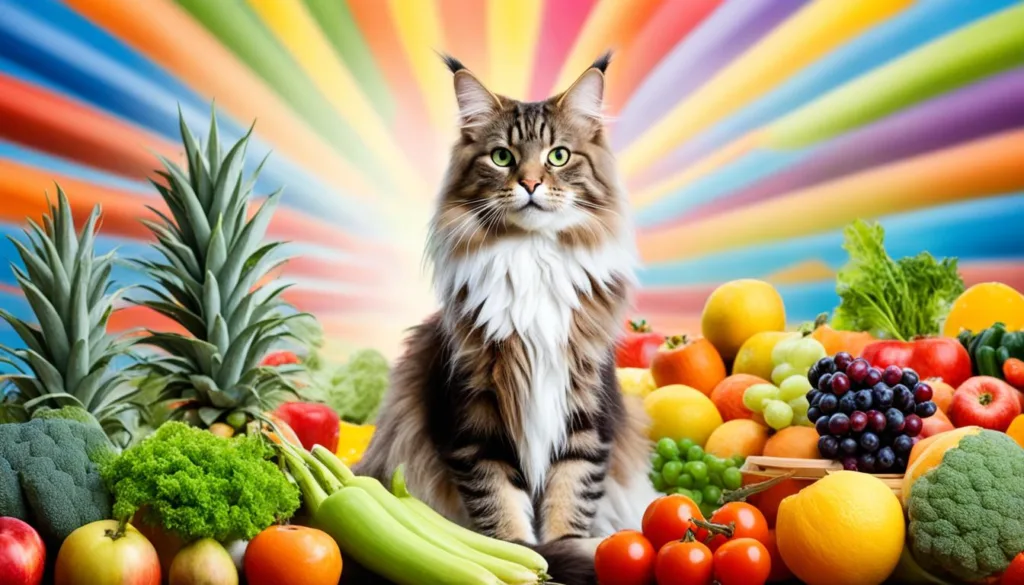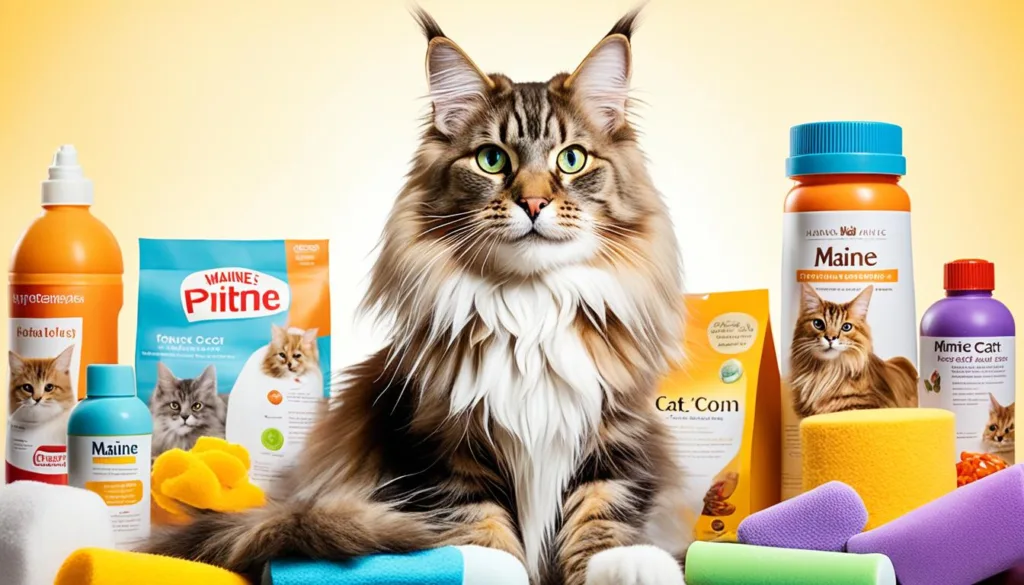Keeping Maine Coon cats healthy and happy needs a proactive approach. These cats are big, look unique, and have sweet personalities. But, they can face health issues unique to their breed. It’s important to get regular vet check-ups, catch problems early, and manage them well to keep Maine Coons healthy and happy for a long time.
This article will cover the health challenges Maine Coons face. It will offer expert advice on how to prevent these issues. By knowing what Maine Coons need, owners can lower the risk of diseases and disabilities. This helps make their Maine Coon friends live better lives.
Key Takeaways
- Maine Coon cats have an average lifespan of 13 years, with some living even longer.
- Genetics play a significant role in the health and lifespan of Maine Coons, emphasizing the importance of responsible breeding practices.
- Proper nutrition, weight management, and regular veterinary care are essential for the overall wellbeing of Maine Coon cats.
- Early detection and management of breed-specific health conditions, such as Hypertrophic Cardiomyopathy (HCM), are crucial for improving outcomes.
- Preventive care strategies, including screening for genetic disorders and addressing dental health, can significantly enhance the quality of life for Maine Coons.
Introduction to Maine Coon Health Concerns
Maine Coons are big, strong cats known for their special looks. They have a rectangular body, big paws, and a thick, double coat. These cats are usually healthy but can have some health issues. It’s important to take care of them early and catch problems before they get worse.
Overview of the Breed’s Unique Characteristics
Maine Coon cats can weigh 13 to 18 pounds for males and 9 to 13 pounds for females. They can live about 12.5 years or more. Their size and thick fur help keep them healthy, but they might face certain health problems.
Importance of Preventive Care and Early Detection
It’s key for Maine Coon owners to take their cats to the vet regularly. Check-ups, screenings, and watching for health issues are important. Catching problems early can make a big difference in their health. Things like shots, deworming, and a good diet also help keep Maine Coons healthy.
| Health Concern | Prevalence in Maine Coons | Key Considerations |
|---|---|---|
| Hypertrophic Cardiomyopathy (HCM) | About 30% of Maine Coons have a gene that makes them more likely to get this heart disease | Regular vet visits and tests can spot HCM early, making it easier to manage and treat |
| Hip Dysplasia | This condition is rare in cats but might be more common in Maine Coons | Managing weight, medicine, and sometimes surgery can help with hip dysplasia in Maine Coons |
| Spinal Muscular Atrophy | Symptoms start around 3 to 4 months old in affected Maine Coons | A DNA test can find carriers, leading to early diagnosis and care for this muscle disorder |
Knowing about Maine Coon health issues helps owners take good care of their cats. By being proactive, they can make sure their cats stay healthy for a long time.
Common Genetic and Hereditary Conditions
Maine Coons face various genetic and hereditary health issues. These include musculoskeletal and cardiac problems. It’s crucial to watch and manage these conditions to keep these cats healthy.
Hip Dysplasia and Other Musculoskeletal Issues
Maine Coons often deal with hip dysplasia. This happens when the hip joint doesn’t form right. It can cause pain, lameness, and arthritis.
Large breeds like Maine Coons are more likely to get hip dysplasia than other cats.
Heart Diseases and Cardiac Abnormalities
Heart health is a big concern for Maine Coon owners. Hypertrophic cardiomyopathy (HCM) is a common heart disease. It makes the heart muscle thicken.
Without treatment, HCM can lead to heart failure.
About 30% of Maine Coon cats have the HCM genetic mutation. Cats with one copy of the mutation are less likely to get sick. But those with two copies face a higher risk.
| Genetic Mutation Status | Likelihood of Developing HCM | Breeding Recommendation |
|---|---|---|
| Heterozygous (1 copy of mutation) | Unlikely to get sick | Can be bred, but not recommended to each other |
| Homozygous (2 copies of mutation) | Higher risk of developing the disease | Not recommended for breeding |
There’s a genetic test for HCM in Maine Coons. It costs $35 for cats and $25 for kittens from the same litter. This test helps breeders avoid breeding cats at risk of this serious heart condition.
Dental and Oral Health Problems
Maine Coons face many dental and oral health issues that need attention. They often get tartar buildup, gingivitis, and periodontal disease. These can cause pain, make eating hard, and lead to bigger problems if not caught early.
About 8 out of 10 cats will have dental health issues. Adult Maine Coons have 30 teeth. To stop dental disease and tooth decay, brush their teeth 2 to 4 times a week. Use safe toothbrushes like the Ultimate Dog and Cat Toothbrush Kit by Bemix.
Maine Coons often get juvenile gingivitis and stomatitis, which hurts a lot. Studies show 8 out of 10 cats, no matter the breed, will have a gum problem. Gingivitis is the top dental issue.
| Dental Condition | Prevalence in Maine Coons | Recommended Treatment |
|---|---|---|
| Stomatitis | Affects approximately 2% of Maine Coons | Dental extractions are a common treatment |
| Gingivitis | The most prevalent dental condition in cats | Daily brushing and use of VOHC-endorsed products |
| Periodontal Disease | Affects majority of adult cats | Early detection and veterinary intervention |
Spotting gingivitis, periodontitis, or stomatitis early is key. It lets you get help fast and manage the problem. Regular dental check-ups and daily brushing at home are key. Use products approved by the Veterinary Oral Health Council (VOHC) to keep your Maine Coon’s oral health in check.

Respiratory and Nasal Issues
Maine Coons can face respiratory and nasal problems, like feline asthma, allergies, and upper respiratory infections (URIs). It’s important to catch these early and manage them well. This keeps the Maine Coon healthy and happy.
Feline Asthma and Allergies
Asthma is common in Maine Coons due to their genes. It causes inflammation and tightness in the airways, making breathing hard. Allergies can also cause sneezing, stuffy nose, and eye problems.
Quick diagnosis and the right treatment are key for Maine Coons with asthma and allergies. This might mean meds, changing the environment, and diet changes. Seeing a vet is important to take care of the cat’s breathing.
Upper Respiratory Tract Infections
Upper respiratory infections (URIs) are a big worry for Maine Coons. They can come from viruses or bacteria and cause runny nose, sneezing, and trouble breathing. These infections can hit Maine Coons harder because they might have weaker immune systems or live in crowded places or are stressed.
Seeing a vet quickly is important for Maine Coons with URIs. Tests like blood work and nasal swabs can find out what’s causing it. Then, meds, oxygen, and care can help ease symptoms and stop more problems.
Preventing these issues is key. Vaccines, reducing stress, and keeping the home clean can help. Regular vet visits are also important for catching and treating problems early.
“Respiratory issues can significantly impact the quality of life for Maine Coons, so it’s essential to be vigilant and work closely with a veterinarian to address any concerns promptly.”
Skin and Coat Concerns
The Maine Coon cat’s coat is a sight to behold but can also cause skin and coat issues. Being a long-haired breed, they need careful grooming. This keeps their coat shiny and prevents problems like skin irritations, matting, and shedding.
Grooming Requirements and Matting Prevention
Maine Coons have long, thick fur that can mat if not brushed regularly. It’s important to brush them at least once or twice a week. This helps remove loose hair and stops tangles.
During shedding seasons, grooming should be more frequent. Bathing should be done only once a month or as needed. Over-bathing can dry out their skin and coat. When bathing, use a gentle, cat-safe shampoo and make sure to rinse well.
- Brush your Maine Coon at least once or twice a week to prevent matting and remove loose hair.
- Bathe your Maine Coon no more than once a month, using a gentle, cat-safe shampoo.
- Avoid over-bathing, as it can strip the natural oils from the coat and lead to skin irritation.
By following these grooming tips, Maine Coon owners can keep their cat’s coat healthy and prevent common skin and coat problems.
“Proper grooming is essential for the Maine Coon’s long, luxurious coat. Neglecting this can lead to matting, skin irritations, and other problems.”
| Skin Issue | Symptoms | Potential Causes |
|---|---|---|
| Atopic Dermatitis | Itchy, inflamed skin | Allergies, environmental triggers |
| Flea Infestations | Itching, hair loss, skin irritation | Flea bites, parasites |
| Bacterial/Fungal Infections | Redness, scaling, hair loss | Bacterial or fungal overgrowth |
Common Health Issues in Maine Coons
Maine Coon cats are usually healthy but face some genetic and breed-specific health issues. They can have musculoskeletal, respiratory, and dental problems. It’s important for owners to know about these health concerns.
Identifying and Managing Breed-Specific Conditions
Maine Coons face several health issues, including:
- Hip Dysplasia: This genetic issue affects about 20% of Maine Coons, leading to arthritis and mobility problems.
- Hypertrophic Cardiomyopathy (HCM): A common heart disease, it affects up to one-third of Maine Coons, studies show.
- Spinal Muscular Atrophy (SMA): A rare genetic disorder, it starts in young kittens and causes muscle weakness and nerve damage.
- Stomatitis: This painful mouth condition is common in Maine Coons, marked by inflammation and mouth sores.
- Polycystic Kidney Disease (PKD): A hereditary condition causing cysts on the kidneys, which can lead to kidney failure.
Dietary Considerations for Maine Coons
Maine Coons can easily become overweight, which worsens other health problems. Owners should watch their cat’s diet and exercise closely. A balanced, high-quality diet and regular exercise can prevent or manage conditions like diabetes, arthritis, and fatty liver disease.

Regular vet visits, catching health issues early, and proper care are key to keeping Maine Coon cats healthy. By understanding these health issues and acting early, owners can help their cats live long, happy lives.
Preventive Care and Regular Veterinary Checkups
Keeping your Maine Coon cat healthy means being proactive. This means regular vet visits and screenings. These steps help catch health problems early, keeping your cat happy and healthy for years.
Recommended Screenings and Diagnostic Tests
Regular vet visits let your Maine Coon’s vet check their health. They do screenings and tests like these:
- Routine physical exams to check overall health and spot issues
- Blood tests for conditions like thyroid problems or kidney disease
- Cardiac screenings, including echocardiograms, to find heart issues like HCM
- Radiographic imaging, such as x-rays, for musculoskeletal problems like hip dysplasia
- Dental exams and cleanings for good oral health and to prevent gum disease
- Fecal tests for parasites and stomach issues
- Vaccinations against diseases like feline panleukopenia, calicivirus, and rabies
By being proactive with your Maine Coon’s health, you can ensure a long, happy life for your cat.
Addressing Maine Coon Health Issues Early
It’s key to spot health problems in Maine Coons early. This helps with quick diagnosis and treatment. By watching closely and acting fast, owners can help their cats get better sooner.
Signs and Symptoms to Watch Out For
Keep an eye on your Maine Coon for any changes. Look for signs like:
- Unexplained weight changes, either gain or loss
- Lethargy or decreased activity levels
- Changes in appetite or thirst
- Difficulty breathing or respiratory distress
- Skin irritations, coat changes, or excessive grooming
- Dental problems, such as bad breath or difficulty eating
Early Intervention and Treatment Options
If you see these signs, get vet help right away. Early action is key to managing Maine Coon health issues. Treatment options include:
- Dietary modifications and nutritional supplements
- Medication to manage chronic conditions
- Physical therapy or rehabilitation exercises
- Surgical procedures to address structural abnormalities
- Regular dental cleanings and preventive care
By tackling health issues early, you can help your Maine Coon live a longer, happier life.
| Condition | Typical Onset Age | Early Intervention Options |
|---|---|---|
| Hip Dysplasia | 3 months to 5 years | Weight management, pain medication, physical therapy |
| Spinal Muscular Atrophy | 3 to 4 months | Supportive care, physical therapy, genetic testing |
| Feline Hypertrophic Cardiomyopathy | 3 to 9 years | Medication, dietary changes, early screening |
| Polycystic Kidney Disease | 8 to 11 years | Dietary modification, fluid therapy, early monitoring |
Conclusion
Keeping Maine Coon cats healthy means being proactive with care and catching health issues early. By knowing about genetic and breed-specific health problems, owners can help their cats live long, happy lives.
Maine Coons are tough but can face health problems like hypertrophic cardiomyopathy and spinal muscular atrophy. Regular vet visits, screenings, and a healthy diet can help prevent these issues. This keeps Maine Coon cats healthy overall.
Owners should watch closely for health problems and deal with them quickly. This way, Maine Coon cats can show off their smarts, gentleness, and hunting skills. With the right care, they can be happy family members for many years.

